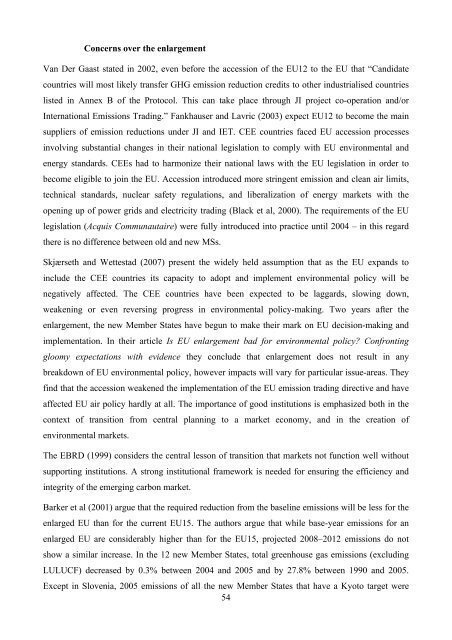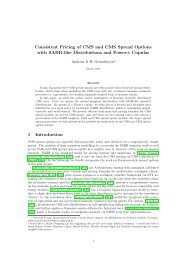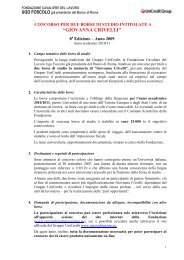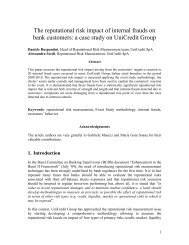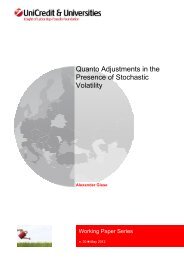Dóra Fazekas Carbon Market Implications for new EU - UniCredit ...
Dóra Fazekas Carbon Market Implications for new EU - UniCredit ...
Dóra Fazekas Carbon Market Implications for new EU - UniCredit ...
You also want an ePaper? Increase the reach of your titles
YUMPU automatically turns print PDFs into web optimized ePapers that Google loves.
Concerns over the enlargement<br />
Van Der Gaast stated in 2002, even be<strong>for</strong>e the accession of the <strong>EU</strong>12 to the <strong>EU</strong> that “Candidate<br />
countries will most likely transfer GHG emission reduction credits to other industrialised countries<br />
listed in Annex B of the Protocol. This can take place through JI project co-operation and/or<br />
International Emissions Trading.” Fankhauser and Lavric (2003) expect <strong>EU</strong>12 to become the main<br />
suppliers of emission reductions under JI and IET. CEE countries faced <strong>EU</strong> accession processes<br />
involving substantial changes in their national legislation to comply with <strong>EU</strong> environmental and<br />
energy standards. CEEs had to harmonize their national laws with the <strong>EU</strong> legislation in order to<br />
become eligible to join the <strong>EU</strong>. Accession introduced more stringent emission and clean air limits,<br />
technical standards, nuclear safety regulations, and liberalization of energy markets with the<br />
opening up of power grids and electricity trading (Black et al, 2000). The requirements of the <strong>EU</strong><br />
legislation (Acquis Communautaire) were fully introduced into practice until 2004 – in this regard<br />
there is no difference between old and <strong>new</strong> MSs.<br />
Skjærseth and Wettestad (2007) present the widely held assumption that as the <strong>EU</strong> expands to<br />
include the CEE countries its capacity to adopt and implement environmental policy will be<br />
negatively affected. The CEE countries have been expected to be laggards, slowing down,<br />
weakening or even reversing progress in environmental policy-making. Two years after the<br />
enlargement, the <strong>new</strong> Member States have begun to make their mark on <strong>EU</strong> decision-making and<br />
implementation. In their article Is <strong>EU</strong> enlargement bad <strong>for</strong> environmental policy? Confronting<br />
gloomy expectations with evidence they conclude that enlargement does not result in any<br />
breakdown of <strong>EU</strong> environmental policy, however impacts will vary <strong>for</strong> particular issue-areas. They<br />
find that the accession weakened the implementation of the <strong>EU</strong> emission trading directive and have<br />
affected <strong>EU</strong> air policy hardly at all. The importance of good institutions is emphasized both in the<br />
context of transition from central planning to a market economy, and in the creation of<br />
environmental markets.<br />
The EBRD (1999) considers the central lesson of transition that markets not function well without<br />
supporting institutions. A strong institutional framework is needed <strong>for</strong> ensuring the efficiency and<br />
integrity of the emerging carbon market.<br />
Barker et al (2001) argue that the required reduction from the baseline emissions will be less <strong>for</strong> the<br />
enlarged <strong>EU</strong> than <strong>for</strong> the current <strong>EU</strong>15. The authors argue that while base-year emissions <strong>for</strong> an<br />
enlarged <strong>EU</strong> are considerably higher than <strong>for</strong> the <strong>EU</strong>15, projected 2008–2012 emissions do not<br />
show a similar increase. In the 12 <strong>new</strong> Member States, total greenhouse gas emissions (excluding<br />
LULUCF) decreased by 0.3% between 2004 and 2005 and by 27.8% between 1990 and 2005.<br />
Except in Slovenia, 2005 emissions of all the <strong>new</strong> Member States that have a Kyoto target were<br />
54


